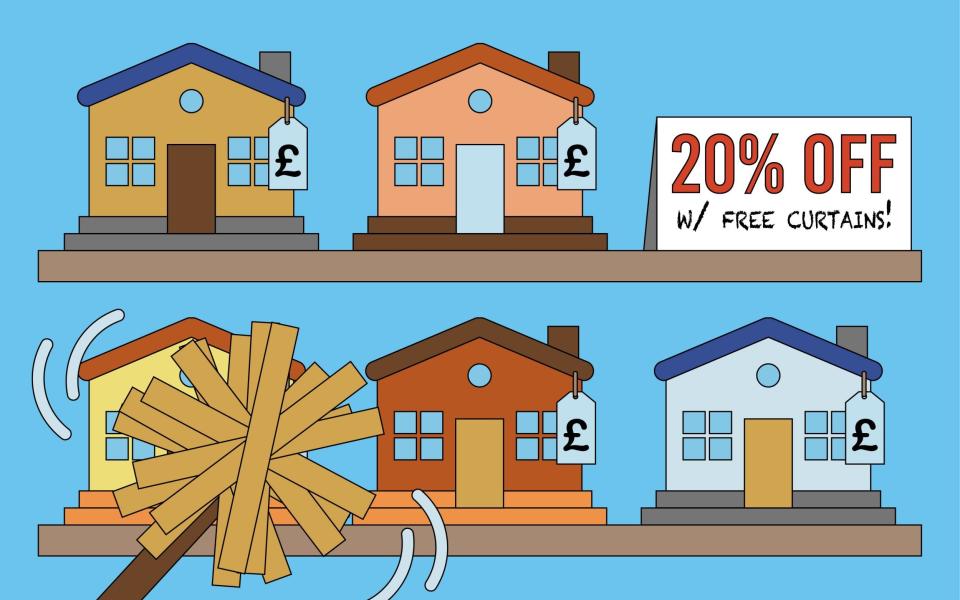How to get the best house price in a falling market

Home buyers are haggling hard as high mortgage rates push the pandemic property boom into reverse.
House prices fell for a fifth month in a row in January, meaning values are now down by 3.2pc from their peak in August., according to lender Nationwide.
Emma Fildes, of Brick Weaver, a buying agent, said: “It’s all negotiation at the moment. Every deal I’ve done recently has had a discount on it.”
“Without a doubt across the market there are definitely reductions,” she added. Buyers have scope to argue 5pc to 10pc off asking prices, she said. “All sellers are expecting to be chipped.”
The annual growth rate has slowed to 1.1pc, according to Nationwide – and this figure will soon turn negative. Halifax Lender Halifax has forecast an 8pc house price fall this year.
Andrew Wishart, of Capital Economics, a research consultancy, said the data suggested the housing downturn “is further advanced than we previously thought”.
Capital Economics has forecast a bigger drop of 12pc, but Mr Wishart said prices could fall further, with the risks “firmly to the downside”.
What does this mean in practical terms if you are trying to buy or sell a home right now? Here experts share their advice for how to get the best deal in a falling market.
First-time buyers
First-time buyers have more opportunity to secure discounts now than buyers higher up the rungs of the property ladder, where sellers are more discretionary.
“If you are buying a new-build, there are lots of discounts. Developers are desperate to get rid of them. And there will be all of those buy‑to-lets that people want to get rid of before the capital gains tax allowance changes,” Ms Fildes said.
But Alex Goldstein, a buying agent based between Yorkshire and London, said the summer could be the optimum time for first-time buyers to make their move. Prices will likely have fallen further – and mortgages could be cheaper, he argued.
Capital Economics has forecast that average rates will fall from 5.7pc in November 2022 to 4.9pc by December.
For a buyer taking out a £200,000 mortgage on a two-year fixed rate, this means they could cut their interest bill from £22,800 to £19,600 – a saving of £3,200 over the course of two years.
Rates could keep falling – Capital Economics has forecast that mortgage rates will fall to 3.5pc by December 2025. Of course, this is not guaranteed – further Bank Rate rises are still in the pipeline and if inflation exceeds forecasts, the Bank of England could be pushed to make larger increases than currently expected.
Buyers who wait for rates to fall further will also find they face more competition as demand rises again.
Upsizing and downsizing
Buyers who need to sell before they make their onward purchase should list their homes on the market this spring – the traditional selling season, agents said.
Sellers should not try to wait out the downturn, Ms Fildes said. “The market will be battered, everyone will be bruised and we will be in recession.
“Prices are not going to shoot up again, there will be much slower growth. If people are making a long-term move, they will do better to crack on now,” she said.
Sellers must also factor in the fact that the legal process of selling has become particularly protracted, and now takes about five months.
If a seller can secure a buyer now, it will be a long time before they will be able to move – and in that time they may be able to secure a better price for their onward purchase.
Buy-to-let investors
High mortgage rates are quickly eroding landlords’ rental income as they come off fixed-rate deals or buy properties.
In low-yielding areas such as London, some investors are finding their properties are becoming loss-making. But in cheaper areas such as the North East, high rental income in proportion to house prices means there is still room for landlords to turn a profit.
Max Armstrong, of North East Property Investments, a buy-to-let specialist, said: “Buy-to-let will still work, but flipping properties to make quick cash is not going to happen in 2023 or 2024.”
He added: “We’re avoiding leasehold and we are buying family properties rather than flats, which have more transitory tenants.
“We haven’t had the 10pc drop in prices that we are expecting yet. In six months there will be more of a perfect storm as people come to the end of their mortgage deals and need to refinance, that will be the big one. People will be more motivated to sell.”

 Yahoo Sport
Yahoo Sport 





































